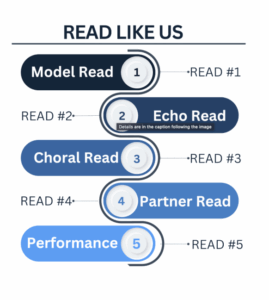Welcome to the Reading Research Recap!
I am Dr. Neena Saha, Research Advisor at MetaMetrics. My focus is bridging the research-practice gap so that you can access useful resources that support reading success, expand awareness of the latest reading research, and inform your teaching and learning strategies. This monthly compendium offers the most relevant and must-read research impacting the reading and learning landscape, including easy-to-view, digestible highlights. We want the data and findings to be as useful to you as possible, so please do connect with me with any ideas and comments for next month. Enjoy the latest Reading Research Recap!
Deep Dive: Can a Simple Protocol Boost Reading Fluency?
Hi everyone, happy fall!
So many students struggle with fluency in the upper elementary grades. This is especially important as text becomes more complex and more cognitive resources need to be allocated to comprehension. Teachers need simple, evidence-based routines to promote fluency and reading stamina in challenging texts. That’s why I want to highlight the “Read Like Us” protocol for fluency described in this new (open access!) paper: Promoting Fluency Through Challenge: Repeated Reading With Texts of Varying Complexity.
What is “Read Like Us”?
Read Like Us is a free fluency protocol to support fluency in upper elementary students.
I thought the protocol was unique in the way it incorporates many evidence-based practices, including
- Repeated and wide reading
- Culturally relevant, engaging texts
- Challenging texts
- Echo, choral, and partner reading
- A final “performance” of the reading
Read Like Us Protocol
The image below is from the paper about Read Like Us: Promoting Fluency Through Challenge: Repeated Reading With Texts of Varying Complexity.

Sample
This study describes the results of a pilot study of the “Read Like Us” protocol in
100 3rd & 4th graders (across 10 different schools). 13% were English Learners.
These students were not randomized to “Read Like Us” vs Business- as-Usual (BAU), so the researchers had to use a statistical technique to balance the intake data of both groups. The final matched sample resulted in 53 students in each condition.
Text Selection
This was a critical part of the Read Like Us program!
The authors selected texts that
- were engaging
- contained grade-level content
- met cultural and linguistic needs
- 10 of the 50 texts were from the existing curriculum
Only after selecting these texts, did they check the Lexile levels of those texts.
- 5 were in the grade 2-3 CCSS Lexile band
- 22 were in the grade 4-5 CCSS Lexile band
- 11 were in the grade 6-8 CCSS Lexile band
- There were 12 poems that were not quantitatively analyzed
(they also looked at qualitative text characteristics like knowledge demands and linguistic conventionality).
Student Measures
The researchers collected student performance on
- Fluency
- Vocabulary
- Comprehension
Results
Students who participated in “Read Like Us” experienced accelerated progress in fluency, and had a slight advantage when it came to vocabulary growth. There were mixed results for comprehension, but that could be because this protocol is focused on fluency and not comprehension.
Quotes from the paper:
“We were pleased with the fluency results, but feel this initial pilot fell short of our vocabulary and comprehension expectations.”
“Read Like Us is a work in progress. As presently constituted, it offers one approach for building upper elementary readers’ fluency; however, room exists for improvement and refinement.”
Classroom implications
The Read Like Us protocol can help improve fluency for students in upper elementary grades. The fluency growth may not transfer to vocabulary growth or comprehension gains (yet).
Be sure to check out the paper and other helpful teaching tips from Jake Downs (one of the researchers on the paper) on the Teaching Literacy Podcast.
Stay tuned for more research and they continue to refine and iterate on the idea!
That’s all for November!
Additional Research of Interest
Professional development, commentary, policy, etc.
- Evaluating a Professional Development Program and Third-Grade Reading Achievement Outcomes in the Context of Colorado’s Read Act
- Toward an equitable implementation of the science of reading: K-5 teachers’ sensemaking and support needs
- (Not so) universal literacy screening: a survey of educators reveals variability in implementation (open access)
- Pre-service teachers’ knowledge of language and literacy concepts: The skeleton in Canada’s closet?
- Virginia Literacy Act Expansion: Implications for Middle Schools
- What’s Hot in Literacy: Foundational and Future-Oriented Practices
- A Survey of Teachers’ Perspectives on Benefits and Concerns of Artificial Intelligence in Literacy Education
- Trends in Text Usage in a Decade of Reading Research: A Systematic Review
- Taking Steps in the Right Direction: Considerations for Implementing Universal Oral Language Screenings in the Schools
Foundational skills and fluency
- The Effects of Advanced Phonemic Awareness Instruction in First Grade
- Exploring teacher language use and early literacy achievement
- Tier 1 Phonics Curriculum Supports Multilingual and SPED Students Who Are Behind on Third-Grade Reading Skills
- Speech sound skills, language comprehension, and early reading development in poor readers
- The Effects of a Computer Delivered Morphological Intervention for Summer Enrichment for Multilingual Learners
- Exploring Cross-Domain Relations in Language and Literacy Profiles of Latine Bilingual Language Learners in the U.S.
- Improving Outcomes for Struggling Readers:Evidence from a Randomized Trial of HEROES (In Press)
- Beyond Definitions: Examining Morphology-Focused Vocabulary Strategies in Second Grade Classrooms
- Promoting Fluency Through Challenge: Repeated Reading With Texts of Varying Complexity (Open access!)
- Development and Validation of Kindergarten Dynamic Assessments of Early Reading and Language
- Assessing Decoding Skills in Newcomer Children: An Analysis of Word and Pseudoword Decoding Scores in Light of Some Contextual Factors
- The Mediating Role of Executive Functions in Reading Fluency Among 8-10 Year Old Children: Evidence from a Transparent Orthography
Dyslexia, Learning Disabilities, Struggling Readers, Etc.
- Syntactic Awareness Skills in Children with Dyslexia: The Contributions of Phonological Awareness and Morphological Awareness
- Assessing Emergent Bilingual Students for Dyslexia
- Feasibility of an online module to prepare pre-service teachers to serve students with dyslexia
- Latent Profiles and Response to Intervention for Students with Co-Occurring Reading and Attention Difficulties
- Rapid decay of perceptual memory in dyslexia
- Dyslexia in higher education: specific and global components of the reading profile
- Word Learning of Readers With Dyslexia: A Test of the Self-Teaching Hypothesis (Dissertation, not yet peer-reviewed)
Comprehension
- Toward stealth assessment of reading comprehension
- Relations Between Executive Functions and Reading Comprehension in Early Primary School Children
- Emotional intelligence predicts initial status and growth of reading comprehension in primary school students
- Relations Between Executive Functions and Reading Comprehension in Early Primary School Children
- The Linguistic Pathways Model: Capturing the Multiple Dimensions of Reading Development
- Sustained Attention as a Cognitive Bridge Between Memory and Reading Comprehension in Primary School Students
- Dramatized Reading in the Classroom: Effect on Learner Readers’ Inferential Comprehension
- Disclosing the effects of automated feedback on reading comprehension, reading motivation, reading engagement, and reading anxiety through personalized technology-enhanced learning
- Predicting reading achievement from reading support: The role of motivation and reading frequency in elementary and secondary school students
Other
- Cortical latency predicts reading fluency from late childhood to early adolescence
- Does adding pictures to easy-to-read texts benefit comprehension for people with reading difficulties? A meta-analytic review
- White matter diffusivity predicts change in sight word reading following continuous theta
- burst stimulation to the left temporal parietal junction
- Are Writing and Reading Beliefs Distinct Constructs?
- Children with and without reading difficulty value robot reading companions that are smart, supportive, and personalised
- The effects of CLIL on L1, L2, and content learning
- Adolescents’ Reading Habits, Critical Reading Self-Efficacy, and Emotion Regulation Skills: A Correlational Study
Subscribe to Our Monthly Newsletter
Stay up-to-date with the latest updates, insights, and announcements from MetaMetrics and our partners.
Sign-up now





